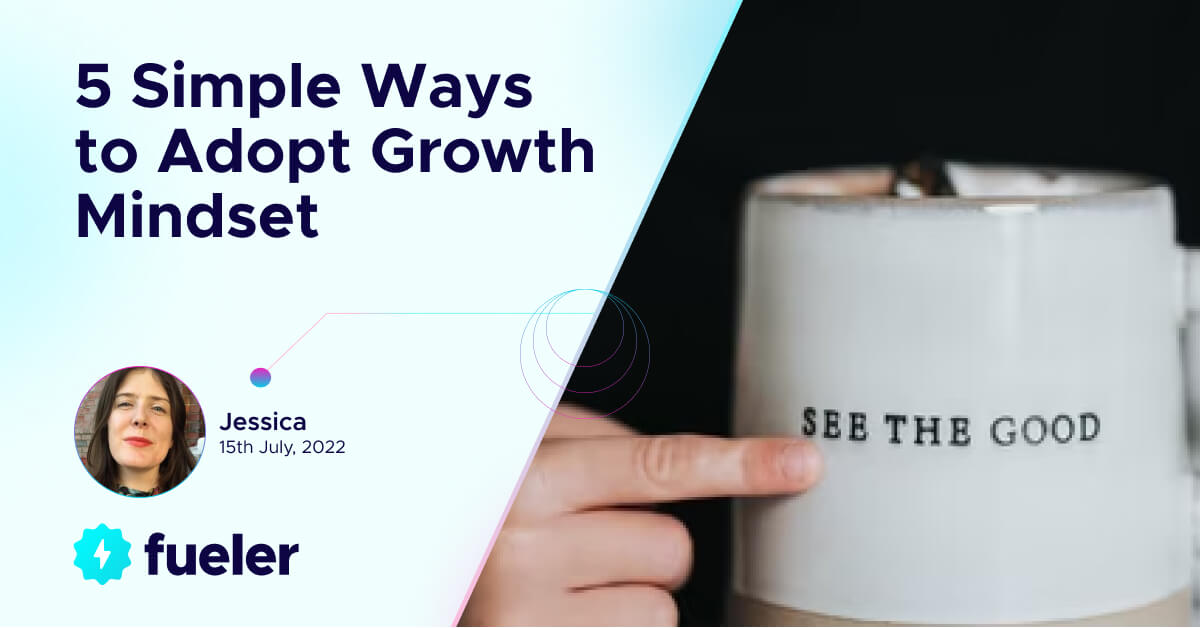5 Simple Ways to Adopt Growth Mindsets

Anshu
15 Jul, 2022

How about a person who is creative, willing to explore, take on challenges, and embrace difficulties with a positive attitude?
Mindsets have a huge influence on our lives. It can be the way we think about ourselves, abilities, potential, future, or the way we see the world. That’s why some people may say life is unfair whereas others have a completely different perspective about life.
You may ask what a mindset is? A mindset generally refers to one’s set of beliefs about themselves, life, success, failure, and those around them. One’s mindset influences the way one thinks about everything. There are generally two types of mindsets .i.e fixed mindset and growth mindset.
Carol Dweck, a psychologist, highlighted the difference between a fixed mindset and a growth mindset. In her research and 2006 book titled “Mindset: The New Psychology of Success”, she stressed the importance of a growth mindset and what it really means to have one. People with a growth mindset believe that their talents and abilities can be developed and improved through hard work.
Individuals with a growth mindset also tend to put more energy into learning and they usually achieve more than those with a fixed mindset. People with a fixed mindset believe that their abilities are innate and that they can’t be changed.
When it comes to a career, a fixed mindset limits one’s learning abilities. You will also experience cognitive inflexibility which makes it difficult for you to learn or explore new opportunities. Adopting a fixed mindset is quite challenging as it will always be hard for you to digest new concepts or apply them in real life.
That’s why it’s essential to foster a mindset of growth. When you embrace growth mindsets, you have a more positive attitude towards effective learning and acquiring life skills. Here, we shall explore several ways in which you can adopt a growth mindset.
5 Simple Ways to Adopt Growth Mindsets
Foster Curiosity
Are you aware of curiosity? Exposing yourself to environments or events that stir curiosity can help you develop a growth mindset. Some people believe that curiosity is inborn, but that’s quite not true. What you are exposed to enables you to adopt a growth mindset.
Curiosity can be developed or improved through many things around us. For example today, we use smartphones and are able to use the same app again and again because it is attractive or serves our interests. The functionalities of a smartphone and how it displays pictures by a mere touch are what drive curiosity.
Just like not all people are equally intelligent, all can’t possess the same levels of curiosity. Sometimes one’s curiosity must be enhanced through learning, spending time with yourself, or exposing yourself to the outside world like playgrounds or through STEM activities. Besides, the following can help you develop a growth mindset;
- Encouragement: Don’t discourage, but rather encourage yourself to take initiative or engage in collaborative activities. Whenever you are encouraged, it allows you to explore more and even learn from mistakes.
- Bring up topics where you say “I wonder”. The phrase “I wonder” is igniting. It can create a sensation that allows you to think deeper and logically. Through this, you also develop problem-solving skills which are some of the vital skills needed in the various professional disciplines.
Recognize & Praise Effort Besides Outcomes
Praising and recognizing effort encourages to never settle for less. You will always be willing to explore new things, learn new skills and take over new opportunities unlike those with a fixed mindset. Praising effort also makes you feel that initiative matters and not only the outcomes. The brain undergoes a change whenever one learns a new thing and this process leads to new neural activity patterns within the brain.
Embrace Imperfections
We live in a world that tends to emphasize achievements, and perfectionism than effort. Raising yourself in such an environment makes you develop a fixed mindset. You will tend to believe that if you aren’t intelligent enough, you matter less or have no value. Your self-esteem and perspective about life will also be hampered.
Not all of us are created equal and that’s why we may exhibit different intelligence levels, talents, and abilities.
We learn through mistakes or imperfections. Instead of branding yourself as a failure or slow learner, it’s best to guide yourself to change or perfectionism. First and foremost help yourself in knowing that it’s normal to fail. Then take a SWOT analysis to understand your strengths and weaknesses.
Your attitudes toward imperfection can either lead to the development of a fixed or a growth mindset. Avoid stereotyping and cultivate grounds for practice to bring about the change that is required. Encourage yourself to be open-minded. Sometimes people confuse open-mindedness with having a growth mindset, but these are two different things.
Read Books
Reading is one of the best ways to expand knowledge and sustain it. People who read a lot tend to be inquisitive and also develop a positive attitude towards challenges. Reading does not only impart knowledge, but it also helps in brain development.
Reading stories can increase your intelligence, reasoning, and information processing. George R.R. Martin an author, screenwriter, and television producer said “A reader lives a thousand lives before he dies . . . The man who never reads lives only one.” Exposing yourself to reading can directly help you become more open to reading whether it’s for academic or entertainment purposes.
Science also shows that one’s brain is sharpened whenever one learns something new like a language or a skill. It also increases cognitive flexibility which leads to better adaptability.
As Open-Ended Questions
Open-ended questions can serve as the perfect platform to inculcate a growth mindset. Generally, open-ended questions are discussional in nature. They require one to think with the objective of validating the opinion. In this case, open-ended questions induce kids to think of a topic or a situation from different perspectives.
You can think about the pros and cons and generate differences and similarities and all of these increase your knowledge base. You are also able to explain opinions in detail and this can help become great thinkers and problem-solvers.
Questions like “do you want to go to Mars or explore space in the future?”. “What is your best movie and what is your favorite character and why”. All these are some of the intriguing open-ended questions you can ask yourself.
Besides open-ended questions, you can also take part in debates or create discussion groups as a way of fostering a growth mindset. Debates and discussions help people learn better ideas or how to perform tasks better.
To encapsulate, there are many ways through which you can nurture growth mindsets. The simple ways explained here will help you grow up with a growth mindset which is essential for academic and professional success. Growth mindsets are key to learning, creativity, and inclusion today. Helping you to develop a growth mindset is like providing a competitive advantage.
Special thanks to Jessica Robinson for writing this blog.
A bit about Jessica,
Jessica Robinson loves to write interesting and knowledgeable blogs regarding business management, education and life to satiate the curiosity of her lovely readers.
Currently, she is serving as a content manager at the ‘Speaking Polymath’. Every piece of content that she writes demonstrates her immense love and passion for her profession.


